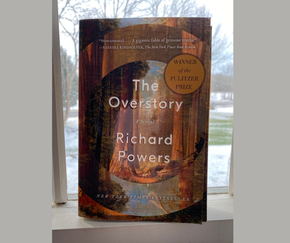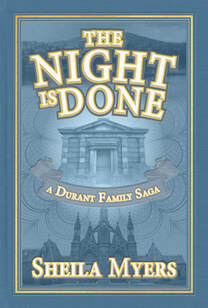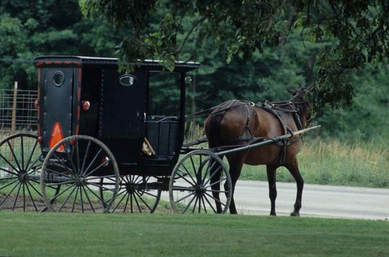And that's ok."  It has taken me a whole year - and I'm not quite finished yet - to read the Pulitzer Prize winning novel The Overstory. And it has been a struggle to get as far as I have in the book. The first part of the book introduces the reader to eight characters. From then on, each chapter, even within chapters if you can call them chapters, reveal a new point of view from characters that you are supposed to remember being introduced to a number of pages prior. It's all very confusing and I would have given up if not for the fact that the writing is so beautiful. It's about trees, but also about human connection to trees and the will of some to fight for trees to be treated as a legal entity - with rights. The most interesting part to me has been the description of a couple who climb a mammoth Redwood in Oregon to try and save it from loggers. The vivid scenes of them swaying in the wind and watching the stars at night made me wonder if the author, Richard Powers, had actually stayed in a tree house to write about the experience. I started the novel before Covid lockdowns, having heard some recommendations from friends. I've spent most of my career educating about and advocating for the natural world so I thought, right up my alley. Once Covid hit and I got into the middle part of the story where the chapters intertwine various characters, my head started to spin and I lost interest. I relegated the book to the shelf in the basement where I keep books to donate to the library for their annual sale. Wouldn't you know it, the library closed and there was no sale. So when our book club met outside around a fire pit one cool evening in the late summer I was reminded about the book by a friend who had finished and loved it. "Maybe I'll give it another try," I thought. I dug it out of the pile of books that had been accumulating all year and started reading again. I didn't bother going back to figure out who was who because I decided the best way to get to the end was not to worry if I couldn't keep track. Life has been like that with Covid. I try not to worry too much about things I can't control (like someone else's story structure) so that I can enjoy the day to day living that is required to get by in these trying times. If I can keep my health, take a walk, talk to my family, and pet my cats, I'd say my life is pretty full. I have a lot to be grateful for. So if it takes me another year to finish this book (because I now have two more books I'm reading sitting by bed stand and on my Kindle), then who cares? I'm just relishing the writing. I'm just enjoying the pleasure of reading while I am able.
1 Comment
 From Kirkus Review A historical novel, set largely in upstate New York’s Adirondack Park, about the troubled lives of real-life real estate investor William West Durant and his embittered sister, Ella. Myers (Castles in the Air, 2016, etc.) continues the story of the Durants in this third book in her Durant Family Saga trilogy. Thomas C. Durant was a railroad magnate who lost a fortune and died under a cloud—and intestate—in 1885. His son, William, assumed control of the family’s remaining assets and began new real estate and construction ventures in the Adirondacks. His sibling, Ella, who was somewhat of a bohemian, always felt financially shortchanged and ill-treated by her older brother—which caused litigation between the two. In the novel, told in the form of reminiscences of various characters, readers follow the arc of William’s career from his early days as a high roller (starting in 1892) to his impoverished life as an old man (circa 1931). In the end, not only has William lost all of his own wealth, but also money and land that Ella won in her final lawsuit—so they both end up losing. However, as William wrote to a friend in 1932, “I am poor, but I am happy, what more can most of us expect?” Myers writes with skill and has chosen well in deeply researching the Durant saga, which remarkably parallels Greek tragedy. It’s a truly engrossing story, and Myers does it justice. William is effectively portrayed as being more clueless than anything else, as he honestly doesn’t understand that he is treating his sister—and his wife, for that matter—very badly. He’s also obsessed with his camps in the Adirondacks, giving readers the impression that he sees the whole park as his personal fiefdom. That’s likely the reason why Myers uses the very clever gambit of telling the story from the perspective of William in his old age, when he’s “calm of mind, all passion spent,” and being interviewed by wealthy Harold Hochschild, who now owns William’s old camp, Eagle’s Nest. To compare William to the aged Oedipus is not so great a stretch. A well-wrought, classically inspired riches-to-rags tale.  An Amish family came out of the train station. They marched in a line, Father, Mother, son, two daughters; plodding along with their hats and bonnets, coattails bobbing, skirts swishing along the sidewalk. It struck me as odd to see them there of all places, (as if the Amish don’t need or use modern transportation) even though there are several Amish communities in the Finger Lakes region where I live. But I still couldn’t help but wonder: where were they going? No van was waiting to pick them up, the nearest bus stop was at least a mile away, and yet, they weren’t fazed by this, they had—purpose. Soon after they passed by my windshield my daughter came ambling out the doors of the station, iphone in one hand, her eyes plastered to its screen, her other hand dragging along luggage. I hadn’t even noticed if the Amish had luggage. I scanned the parking lot looking for them. Poof, they were gone. “Did you see that Amish family?” I asked her when she got in the car. “No,” she replied. “But weren’t they on your train from New York?” I said. She shrugged. “Possibly.” And she went back to examining an email from work. Months later as I read David William’s When the English Fall, a dystopian novel set in an Amish community near Lancaster, PA, my mind wanders to the vision of that family and wonder if I have sacrificed my own sense of purpose to stay connected to a virtual reality. In William’s novel, a celestial storm knocks out the power grid throughout most of the world. Planes fall from the sky, villages, towns, and cities go dark. Only the Amish appear unfazed by the event as they are used to living off the grid. |
AuthorSheila Myers is an award winning author and Professor at a small college in Upstate NY. She enjoys writing, swimming in lakes, and walking in nature. Not always in that order. Archives
April 2024
CategoriesAll Adirondacks Algonquin Appalachia Award Cades Cove Canada Chestnut Trees Christmas Civilian Conservation Corps Collis P. Huntington Creativity Doc Durant Durant Family Saga Emma Bell Miles Finger Lakes Great Depression Hell On Wheels Historical Fiction History Horace Kephart Imagination National Parks Nature Publishing Review Screenplay Short Story Smoky Mountains Snow Storm Stone Canoe Literary Magazine Thomas Durant Timber Wilderness World War II Writing |
|
|
All materials Copyright 2022
Any reproduction, reprint or publication without written consent of author prohibited. |
 RSS Feed
RSS Feed